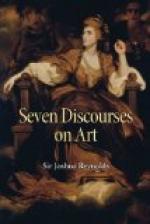Author: Joshua Reynolds
Release Date: May 8, 2005 [eBook #2176]
Language: English
Character set encoding: ISO-646-us (us-ASCII)
***Start of the project gutenberg EBOOK seven discourses on art***
Transcribed from the 1901 Cassell and Company edition by David Price, email ccx074@coventry.ac.uk. Proofing by David, Dawn Smith, Uzma, Jane Foster, Juliana Rew, Marie Rhoden and Jo Osment.
SEVEN DISCOURSES ON ART by Joshua Reyonds
INTRODUCTION
It is a happy memory that associates the foundation of our Royal Academy with the delivery of these inaugural discourses by Sir Joshua Reynolds, on the opening of the schools, and at the first annual meetings for the distribution of its prizes. They laid down principles of art from the point of view of a man of genius who had made his power felt, and with the clear good sense which is the foundation of all work that looks upward and may hope to live. The truths here expressed concerning Art may, with slight adjustment of the way of thought, be applied to Literature or to any exercise of the best powers of mind for shaping the delights that raise us to the larger sense of life. In his separation of the utterance of whole truths from insistance upon accidents of detail, Reynolds was right, because he guarded the expression of his view with careful definitions of its limits. In the same way Boileau was right, as a critic of Literature, in demanding everywhere good sense, in condemning the paste brilliants of a style then in decay, and fixing attention upon the masterly simplicity of Roman poets in the time of Augustus. Critics by rule of thumb reduced the principles clearly defined by Boileau to a dull convention, against which there came in course of time a strong reaction. In like manner the teaching of Reynolds was applied by dull men to much vague and conventional generalisation in the name of dignity. Nevertheless, Reynolds taught essential truths of Art. The principles laid down by him will never fail to give strength to the right artist, or true guidance towards the appreciation of good art, though here and there we may not wholly assent to some passing application of them, where the difference may be great between a fashion of thought in his time and in ours. A righteous enforcement of exact truth in our day has led many into a readiness to appreciate more really the minute imitation of a satin dress, or a red herring, than the noblest figure in the best of Raffaelle’s cartoons. Much good should come of the diffusion of this wise little book.




